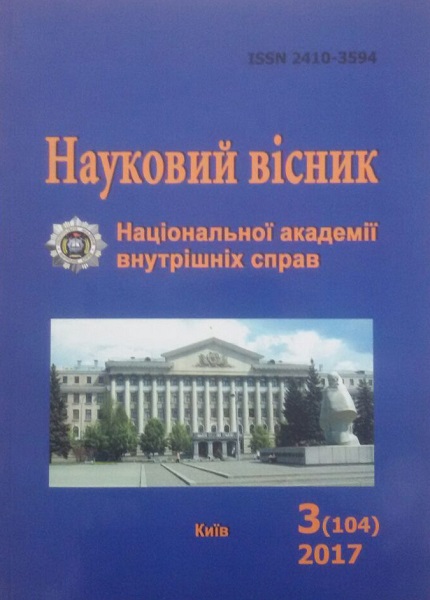Features of Criminal Responsibility for Misuse of Power or Employment Provided by Public Workers
Abstract
Ukrainian legislation regulating prosecution of white collar
crimes including the anti-corruption element is being constantly
updated and thus characterized as ovestructured and cluttered. All
amendments concerning legal prohibitions undoubtedly have to be
well-scheduled and reasonable with a chance to be duly analyzed
and commented by scientists and experts. So far the
abovementioned process of permanent criminal legislation
«upgrading» is only picking up speed, inter alia provisions regulating
liability for white collar crimes.
Taking into consideration the current criminal-legal
background, author provides analysis of legislative regulation of
liability for white collar crimes. Article contains characteristics of
objective and subjective features of the mentioned crimes and
problematic issues overview including imposition of a penalty.
Attention is paid to decriminalization in Art. 364 of the Criminal Code
of Ukraine by amending its note.
Оbjective element of power or authority abuse has three
essential features: act – use of power or authority by public official in
opposition to state interest through specific activity/inactivity of the
subject; consequences – substantial damage caused to legally
protected rights, freedoms and interest of individuals/legal entities or
state interest; causal connection between act and consequences. If
at least one feature is not present – corpus delicti under Art. 364 of
the Criminal Code of Ukraine is not defined.
Subject of a crime – public official (NPU staff is also referred to
this category). Subjective element is characterized in terms of act as
direct intention and in terms of special purpose – acquisition of illegal
benefit by the subject or other individual/legal entity; consequences
are characterized by intention or negligence (Art. 364 (parts 1–2) of
the Criminal Code of Ukraine).
Constant updating of criminal legislation does not always
adequately affect the enforcement process. One of the key problems
related to the crime classification is interpretation of «substantial
damage» and «grave consequences» which are defined as essential
consequences of power or authority abuse. One of updates which
led to numerous discussions among both scholars and experts was
the adjustment of the abovementioned definitions on the basis of the
Law of Ukraine «On Amendments to Legislative Acts of Ukraine
Regulating the Implementation of State Anti-Corruption Policy in
Accordance with the Visa Liberalization Action Plan» from May 13,
2014 through extraction the provisions on material damage from
clauses 3–4 of the note to Art. 364 of the Criminal
Code of Ukraine.
Downloads
Abstract views: 96 PDF Downloads: 834
- Authors reserve the right to authorship of their own work and transfer to the magazine the right of the first publication of this work under the terms of the Creative Commons Attribution License, which allows other persons to freely distribute published work with mandatory reference to authors of the original work and the first publication of an article in this magazine.
- Authors have the right to enter into separate additional agreements on non-exclusive dissemination of the work in the form in which it was published in the journal (for example, to post an article in the institution's repository or to publish as part of a monograph), provided that the link to the first publication of the work in this journal is maintained.
- The journal's policy allows and encourages the posting of articles by authors on the Internet (for example, in electronic storehouses of institutions or on personal websites), both before the submission of this manuscript to the editorial office and during its editorial processing, as this contributes to the creation of a productive scientific discussion and positively affects the efficiency and dynamics of citing the published work.




